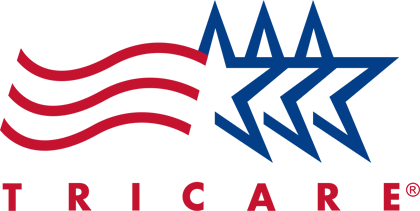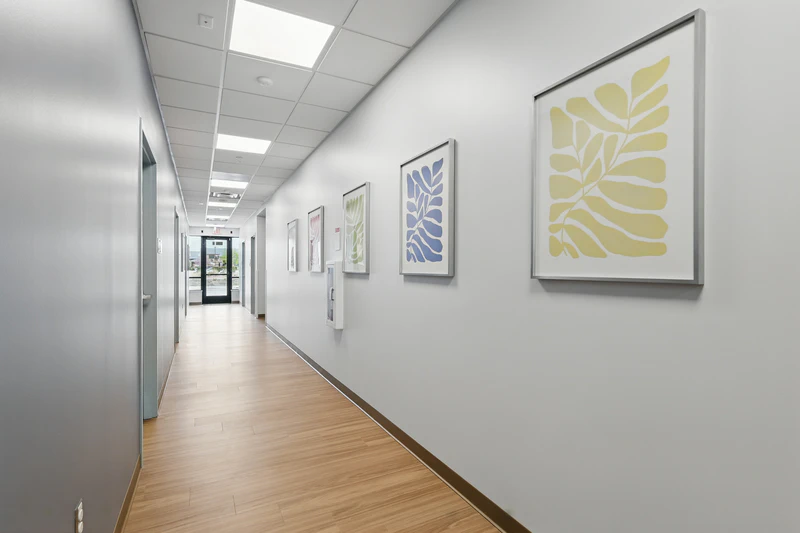Teen Bipolar Disorder Treatment with TRICARE Insurance in and Around Dallas, Texas
BasePoint Academy Accepts TRICARE Insurance in Texas for Teen Bipolar Disorder Treatment
Research shows that approximately 28% of bipolar disorder cases begin before age 13, and nearly 38% develop during the teenage years between 13 and 18. If your child is struggling with intense mood swings or behaviors linked to bipolar disorder, BasePoint Academy provides comprehensive teen bipolar treatment in Dallas, Texas, and the surrounding area.
Our clinical team specializes in adolescent mood disorder treatment, combining evidence-based therapy, psychiatry, and family support to promote stability and long-term recovery. We also proudly partner with TRICARE insurance, helping military families and dependents navigate their TRICARE rehab benefits for teens to access affordable, high-quality mental health care.
This page outlines how TRICARE coverage for bipolar disorder treatment works and what steps to take to ensure your teen receives the support, structure, and care they need to thrive
What Are Common Bipolar Disorder Symptoms Seen in Teens?
Bipolar symptoms in teens often swing between mood extremes, including periods of mania and depression. Mania involves intense energy, impulsive decisions, and sometimes risky behavior, while depression brings feelings of sadness, low energy, and withdrawal from activities. Some teens may experience hypomania—a milder form of mania with less severe symptoms but noticeable changes in mood and activity.
You might also hear bipolar disorder referred to by its older name, manic depression, which highlights these mood shifts between high and low states. Understanding bipolar disorder causes is still an active area of research, but it’s clear that genetics, brain chemistry, and environmental factors all play a role. Research suggests that bipolar genetics play a significant role in increasing a teen’s risk of developing the condition.
A bipolar diagnosis in adolescents involves carefully assessing these symptoms and their impact on daily life. Since this condition can look different in each teen, recognizing the range of symptoms is key to getting timely support and effective bipolar disorder treatment.
Bipolar Disorder in Texas Teens: Relevant Facts
Bipolar disorder often shows up earlier than many parents expect—with research from Frontiers in Psychiatry revealing that nearly 28% of cases begin before age 13, and another 38% emerge during the teen years. Over the past few decades, bipolar disorder diagnoses in young people have been rising steadily.
Kids with a family history of bipolar disorder face even higher risks. Studies show that children of bipolar parents are significantly more likely to develop mental health conditions themselves, with 4% to 6% experiencing bipolar I disorder. ADHD is also frequently diagnosed alongside bipolar disorder, affecting the vast majority of younger children and about half of adolescents.
As bipolar disorder symptoms intensify, some teens require more structured care: around 17% of youth with bipolar spectrum disorder have taken part in Partial Hospitalization Programs (PHPs). And while treatment is critical, so is recognizing the emotional weight these teens carry. Research underscores their heightened risk of suicidal thoughts and behaviors, reminding us just how vital early, comprehensive care is.
Where to Visit in Texas, The Lone Star State
Texas has a rhythm all its own—bold, vibrant, and full of unexpected calm. In the heart of the Dallas-Fort Worth Metroplex, you’ll feel that contrast firsthand. Dallas blends sleek skyscrapers with quiet escapes like the Arboretum, while Fort Worth slows things down with rustic charm, historic Stockyards, and galleries that rival the best.
Further south, Austin (the state capital) invites you into its creative pulse. Think live music under the stars, trails that wind through nature, and a spirit that reminds you to breathe a little deeper. San Antonio offers a gentler pace, with tranquil moments along the River Walk and stories etched into the Alamo. And in Houston, the sprawl becomes an advantage—NASA, green space, global flavors—all in one place. No matter where you land, the Lone Star State offers space to reset, reconnect, and help your teen feel grounded again.
Teen Bipolar Disorder Treatment with TRICARE Insurance Coverage
Our complimentary assessment with a licensed clinician will provide you with a recommendation for the appropriate level of care for your teen struggling with bipolar disorder. We can also check your TRICARE mental health provider coverage levels.
Call us today to schedule a complimentary same-day assessment at (972) 357-1749 or complete our inquiry form.

TRICARE Insurance Bipolar Disorder Treatment Admissions form
An Intro to TRICARE Insurance Coverage
TRICARE is the military’s health insurance program, supporting active-duty service members, veterans, retirees, and their families. Managed by the Defense Health Agency under the U.S. Department of Defense, it was launched in the ’90s to streamline access to quality healthcare.
Today, TRICARE coverage options include TRICARE Preferred Provider Organization (PPO), TRICARE Health Maintenance Organization (HMO), and TRICARE prescription drug plans, among others. TRICARE plans come with their mix of premiums, deductibles, and copayments, but all are designed to keep care within reach without overwhelming your budget.
Whether you’re stateside or stationed abroad, TRICARE connects you to a network of both military and civilian providers—including specialized mental health centers like BasePoint Academy. If you’re unsure what your specific TRICARE health insurance plan includes, call BasePoint Academy. We’re happy to confirm your mental health benefits with TRICARE in Texas, so you can begin building a path toward genuine healing for your teen.
Does TRICARE Cover Teen Bipolar Disorder Treatment in Texas?
Yes. TRICARE in Texas covers teen bipolar treatment and its many manifestations, including bipolar I disorder. If your child is living with the disruptive mood swings of bipolar disorder, TRICARE often covers proven approaches like cognitive behavioral therapy, mood stabilization strategies, bipolar medication, and other evidence-based treatments that address both manic and depressive episodes.
These services can be accessed through military clinics or trusted civilian providers like BasePoint Academy. Your out-of-pocket costs, like copays and deductibles, will depend on the TRICARE individual insurance plan you’re using and where you receive care. Many TRICARE plans require a referral or prior authorization to show that bipolar disorder treatment is medically necessary.
Consulting rehab centers in Texas that take TRICARE insurance, like BasePoint Academy, can clarify the necessary details. Contact us today. We’ll walk you through the process, check your TRICARE bipolar disorder coverage, and help you explore treatment options that support long-term stability and emotional balance in youth.

Will TRICARE Cover Teen-Focused Bipolar Disorder Therapy and Counseling in Texas State?
Yes. TRICARE covers teen therapy and youth counseling for bipolar disorder in Texas. That means your teen can access personalized bipolar support for mood swings and the other challenges that often come with this condition. Bipolar therapy may involve cognitive behavioral therapy, family-focused care, and other evidence-based methods. Your teen will connect with licensed professionals specializing in adolescent therapy.
TRICARE teen therapy coverage opens the door to sessions that focus on regulating teenage emotions, contribute to teenage stress reduction, and emphasize long-term stability. Whether your teen is receiving bipolar therapy once a week or within a more structured day treatment program, the aim is to help your teen better understand their mood shifts, strengthen coping skills, and feel more in control of their mental health.
Before beginning treatment, it’s important to double-check what your specific TRICARE teen counseling coverage includes. You can call us or review your policy documents to confirm coverage. At BasePoint Academy, we make the process easier with free insurance verification and navigating what comes next—because getting your teen the proper care shouldn’t be complicated.

Does TRICARE Offer Coverage for Psychiatrist Visits for Teenagers with Bipolar Disorder in TX?
TRICARE bipolar disorder often covers psychiatrist visits in Texas. Psychiatric care is frequently an integral component of comprehensive bipolar management and treatment. When your child sees a psychiatrist within the TRICARE provider network, those appointments are typically included in your plan’s medical coverage.
Psychiatric care under TRICARE may involve evaluations, medication management, and ongoing check-ins to fine-tune your teen’s treatment plan. These visits are essential for diagnosing bipolar disorder, prescribing mood stabilizers, and adjusting care as your teen’s needs evolve. When paired with psychotherapy, psychiatric support plays a crucial role in helping teenagers build emotional stability and stay on track toward lasting wellness.
Does TRICARE Cover Prescribed Medications for Teen Bipolar Disorder Treatment in Dallas, Texas?
Yes. TRICARE in Dallas, Texas, includes coverage for prescribed bipolar medications for teens. If a TRICARE-authorized psychiatrist determines that medication is part of your teen’s treatment plan, those prescriptions are covered under TRICARE’s pharmacy benefits. That means you’ll have help offsetting the cost of essential mood stabilizers and other medications used to support teenage well-being and emotional regulation.
TRICARE bipolar disorder coverage benefits usually include FDA-approved drugs commonly prescribed for bipolar disorder in adolescents. In addition, follow-up visits and medication reviews will ensure your teen’s bipolar treatment stays on track. If you’re ready to confirm your TRICARE health insurance benefits or have questions about next steps, contact BasePoint Academy today.
BasePoint Academy Accepts TRICARE PTSD Treatment Coverage
We accept most major health insurance providers in Texas and can check your TRICARE coverage levels for teen bipolar disorder treatment on your behalf. Contact us today!
Bipolar Disorder Treatment Centers for Teens in Texas That Accept TRICARE
BasePoint Academy proudly operates multiple rehab centers in Texas that take TRICARE insurance. Our programs recognize the unique teenage challenges associated with mood disorders, and our safe and supportive space is curated for personal healing and growth. We understand the complexities of bipolar disorder, and we tailor every step of care to meet your teen’s individual needs.
Through proven therapies, compassionate psychiatric support, and customized treatment plans, BasePoint stands out as a trusted Texas provider that accepts TRICARE. From day treatment programs to psychiatric evaluations and ongoing adolescent therapy, we’re here to guide your child toward stability and hope. Explore our locations below or call (972) 357-1749 to arrange a complimentary bipolar disorder assessment to kickstart your teen’s journey to wellness.
- Arlington, Texas: 3900 Arlington Highlands Blvd, Suite 237, Arlington, TX 76018
- Forney, Texas: 713 W Broad St, Suite 200, Forney, TX 75126
- Frisco, Texas: 8275 Judges Way, Suite 100I, Frisco, TX 75036
- McKinney, Texas: 4733 Medical Center Drive, McKinney, TX 75069

How Much Is the Cost of Bipolar Disorder Treatment for Teens Without TRICARE Support?
Without TRICARE support, bipolar disorder treatment for teens in Texas can quickly add up. Individual therapy sessions may cost anywhere from $100 to $250 or more, depending on the provider and treatment intensity. More comprehensive programs like Intensive Outpatient (IOP) or Partial Hospitalization (PHP) can run into the thousands each month if you’re paying out of pocket.
The cost of mental health treatment can fluctuate based on where you live, the expertise of the therapist, and whether psychiatric care or medication management is part of the plan. While some clinics offer sliding scale fees or payment plans, having TRICARE bipolar disorder coverage can make a huge difference, easing financial pressure and ensuring your teen gets steady, quality care.
If you’re among the 17% of Texans without insurance, don’t lose hope. BasePoint Academy is here to help you find affordable options tailored to your family’s needs. Call us to connect with a caring team member who can guide you toward viable solutions.
Contact BasePoint Academy Today
Contact us today to schedule a free confidential assessment for your teen with a licensed clinician.
You can also get in touch to talk with our mental health experts about treatment needs, care options and your insurance coverage levels.
Call: (972) 357-1749Check Your InsuranceTeenager Bipolar Disorder Programs That Take TRICARE in Texas State
In Texas, TRICARE makes it possible to access a range of teen mental health resources, including bipolar disorder treatment programs tailored specifically to this age group. Whether your child needs weekly therapy sessions or more structured care, TRICARE teen therapy coverage can open the door to meaningful treatment that goes beyond symptom control, promoting long-term emotional stability and growth.
If you’re ready to explore treatment options or need help verifying your TRICARE health insurance benefits, reach out to BasePoint Academy. We’re here to support you every step of the way, beginning with a free assessment to determine the most suitable level of care for your teen. In the meantime, here’s a brief look at two common types of teen-focused bipolar disorder programs that typically accept TRICARE in Texas:
Teen Bipolar Disorder Intensive Outpatient Programs
An Intensive Outpatient Program (IOP) offers a structured yet flexible treatment path for teenagers who need more than weekly therapy but don’t require round-the-clock care. In a bipolar-focused IOP, your teen would attend several therapy sessions each week—often for a few hours per day—while maintaining school and home life.
These programs center on emotional regulation, coping skills, and understanding bipolar patterns, all under the guidance of licensed professionals. When considered medically necessary and provided by a TRICARE-authorized facility like BasePoint, IOPs are typically covered. Treatment often includes individual sessions, bipolar disorder group therapy, and family involvement, ensuring your teen isn’t navigating this psychiatric illness alone.

Teen Bipolar Disorder Partial Hospitalization Programs
Partial Hospitalization Programs (PHPs) offer a more intensive level of care than IOPs, usually running five days a week for most of the day. Teens return home each evening, but during the day, they receive comprehensive bipolar disorder treatment, including therapy, psychiatric support, and structure. These interventions manage mood swings and support teens’ mental health while stabilizing emotions.
TRICARE bipolar disorder coverage may cover PHPs when this level of care meets your teen’s clinical needs and is delivered by an authorized provider. PHPs are often a transitional step: either a bridge from inpatient care or a proactive step up from outpatient treatment. For teens in crisis or struggling with extreme mood swings, PHPs can be a vital part of restoring balance and building resilience.
Types of Bipolar Disorder in Texas Commonly Covered by TRICARE
TRICARE bipolar disorder coverage in Texas typically includes a range of diagnoses under the bipolar spectrum, ensuring youth can access care that matches their specific needs. From classic mood shifts to less obvious patterns, bipolar disorder can show up in different ways—and TRICARE and BasePoint Academy aim to support treatment across the board.
In the following sections, we’ll walk through the three main subtypes of bipolar disorder that may be covered under TRICARE plans. While this list isn’t exhaustive, it gives a strong starting point to understand the kinds of bipolar diagnoses that often qualify for care through the TRICARE provider network.
Bipolar I
Bipolar I disorder is the most well-known form of this psychiatric illness. It’s marked by intense mood episodes, including full-blown mania that may last a week or longer. Teens with bipolar I disorder may also experience periods of deep depression in between manic episodes. These mood shifts can disrupt school, relationships, and family life, making early diagnosis and treatment essential.
Bipolar II
Bipolar II disorder involves mood swings, but instead of full manic episodes, it includes hypomania—shorter, less intense bursts of energy or irritability. These can seriously impact adolescent behavior, especially when followed by depressive episodes that linger and affect daily functioning. Teens with bipolar II disorder may appear high-functioning at times, making the condition harder to recognize without professional help.
Cyclothymia
Cyclothymia is a milder form of bipolar disorder characterized by chronic mood swings that don’t fully meet the criteria for mania or depression. Teens with cyclothymia experience ongoing emotional ups and downs that interfere with life, even if the symptoms aren’t as extreme as those seen in other bipolar subtypes. Bipolar research continues to explore how cyclothymia affects teens long-term.

How to Verify My TRICARE Policy Details
Checking your TRICARE coverage is simpler than you might expect, and it’s the crucial first move toward securing the compassionate bipolar disorder treatment your teen needs. Whether you’re uncertain about what your plan includes or just want clear guidance on what comes next, clarification is only a phone call away. Contact BasePoint Academy at (972) 357-1749 today.
We’ll guide you through your TRICARE health insurance benefits, making sure you understand every detail, so that you don’t have to navigate the insurance process alone. Confirming your teen’s coverage opens the door to essential services, from personalized bipolar therapy to programs developed to build lasting emotional strength. Take that confident step forward and discover the clarity that makes all the difference.
Facts About Teens and Bipolar Disorder for Texas Families
- According to a study published in Frontiers in Psychiatry, bipolar disorder first appears in about 28% of children before age 13, and in nearly 38% of teens between the ages of 13 and 18.
- Growing research shows a noticeable rise in bipolar disorder diagnoses among young people in recent years. In fact, between 1995 and 2000, the number of youth receiving outpatient treatment for bipolar disorder through private insurance jumped by 67%.
- Studies comparing adolescents of parents with bipolar disorder to those whose parents don’t have the condition consistently show that children of bipolar parents are much more likely to face mental health challenges—especially bipolar I disorder, which appears in about 4% to 6% of these children.
- ADHD is the most frequently seen co-occurring condition in adolescents with bipolar disorder, affecting between 70% and 95% of younger children and about 50% of teens with the diagnosis.
- A study examining treatment use over one year found that 17% of adolescents with bipolar spectrum disorder participated in Partial Hospitalization Programs (PHP) during that time.
- According to the Child and Adolescent Psychiatric Clinics of North America, youth with bipolar disorder are at a high risk for suicidal thoughts and behaviors.
Contact BasePoint Academy for Teen bioplar Treatment with TRICARE Mental Health Providers Today!
Has your teen exhibited bipolar disorder symptoms? If you are concerned about the mental health of your teenager, contact BasePoint Academy to discuss a treatment plan that takes TRICARE insurance.
